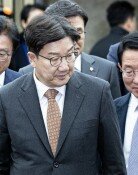Japan’s revisions of 3 national security documents
Japan’s revisions of 3 national security documents
Posted December. 17, 2022 07:16,
Updated December. 17, 2022 07:33
At a Cabinet meeting Friday, the Japanese government approved revisions to the three national security documents to specifically indicate the securing of the ‘capability to counterattack’ the enemy’s military base and the doubling of its national defense budget. Tokyo has thus adopted an offensive security strategy under the pretext of North Korea’s nuclear weapons and missiles and China’s threat to attack Taiwan. As a result, Japan’s ‘defense only’ principle that rules out the attack and focuses on defense, which Tokyo maintained since its defeat in the Second World War, has seen a marked shift for the first time in 77 years.
The revised national security strategy completely nullifies the ‘Pacificist Constitution’ that clarifies Tokyo’s ‘permanent give-up of war and exercise of force, non-ownership of the army, the navy and the air force, and denial of the right to engage in combat.’ Tokyo aims to secure a long-range attack capability to strike an enemy’s military base and double its national defense budget from 1 percent of its GDP to 2 percent within five years. Moreover, Japan will seek to create a combined forces command of the army, the navy, and the air force, with its commander to be coordinating the operation of its combat forces with the U.S. military.
Japan claims these are ‘essential minimum defense measures’ when North Korean missiles fly across the Japanese archipelago, and Chinese missiles fall into its exclusive economic zone. But it is nothing more than a plot for Japan to transform into a country capable of going into war by avoiding a revision to the Pacificist Constitution, which is strongly resisted internally in the island country. Notably, Tokyo has made it possible to apply the principle of exercising its capability to counterattack not only when it is directly under attack by foreign forces but also when the U.S. comes under attack. The measure has effectively opened the possibility for Tokyo to launch a preemptive strike. This means the Japanese Self-Defense Force could intervene during the war on the Korean Peninsula.
If Japan doubles its national defense budget within five years, Tokyo’s military spending, which currently stands at ninth in the world, will rank third only after the U.S. and China. Thus, Japan is accelerating its bid to become a military superpower living up to its economic stature as the world’s third-largest economy and to achieve the dream of its rightist group, including the late former Prime Minister Shinzo Abe. The new security documents define China as ‘the biggest strategic challenge that has not existed thus far,’ thereby keeping pace with the U.S.’ national security strategy. That is, Tokyo intends not to hesitate to play the role of a regional power that will spearhead the efforts to keep China in check amid the environment of a new Cold War.
South Korea should naturally be wary of changes in the security situation in Northeast Asia, which will be wrought by the rise of Japan’s military power. As North Korea’s nuclear and missile threats constantly mount, South Korea will be surrounded by countries racing to become the world's second and third strongest military powers. Even so, South Korea, which inevitably needs security cooperation between South Korea, the U.S., and Japan to counter Pyongyang’s nuclear threats, cannot afford to worry about the changing situation simply. South Korea should make efforts to strengthen its self-defense capability now more than ever before unless, of course, it is complacent with becoming a sub-partner of a regional alliance led by Tokyo.







